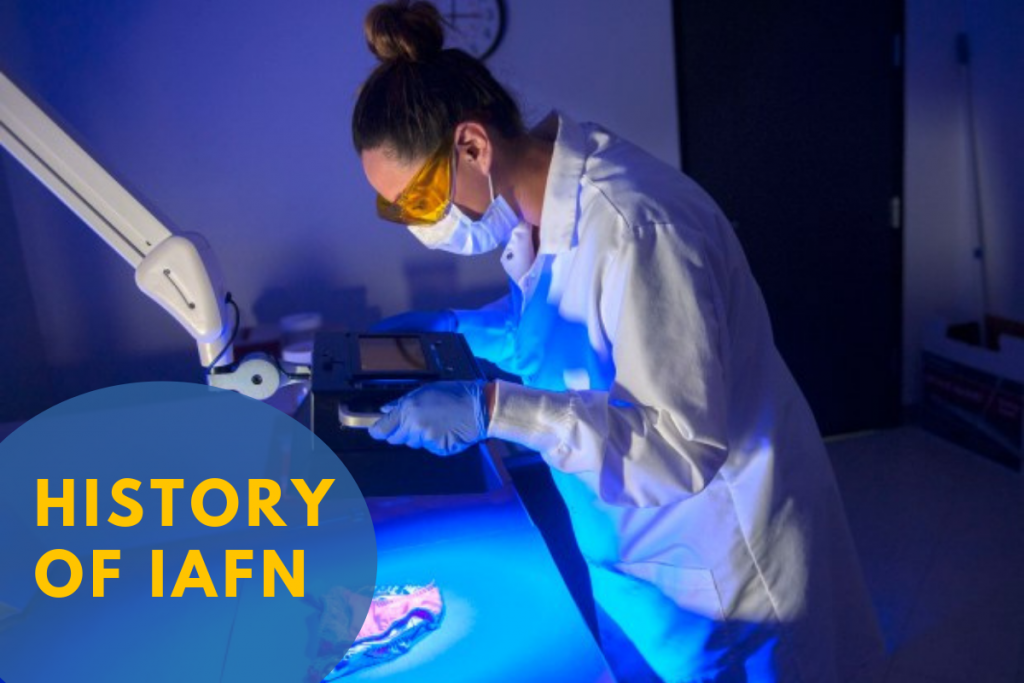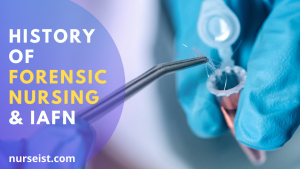Before the early 1990’s, forensic nursing wasn’t even a thing! Even though we can trace back nursing since the beginning of the 19Th century. It took about 100 years before forensic nursing was established. Comparatively with the other specialized nursing field, forensic nursing is quite new. Forensic nursing was born out of a conference in St. Paul Minnesota in 1992 when a group of 70 nurses collaborated with each other in a national convention of sexual assault program. During the conference, it quickly became aware to the participant about their similar problems in every healthcare center.
Nursing is often thought of as both an art and science which has a heart and a mind. Since forensic nursing is quite new in the field, many people are not yet aware of its roles. But thanks to media and entertainment, nowadays people have a much clearer idea of forensic nursing. TV series and movies have been portraying forensic nursing in their own ways to the public. Many nurses have complained that media hasn’t quite been able to depict forensic nursing accurately. But things have been improving and accurate portrayals of nurses are being shown in media and entertainment.
So how did forensic nursing begin? Unofficially forensic nursing began even before it was even recognized as a specialized nursing field. We can trace back forensic nursing in the 13th century, during that time there were nurses who played the role of forensic practitioners as they examine the young women (to check their virginity) arranged to marry royalty.
Nurses during that time also worked with sexual assault victims and domestic abuse victims. Before the recognition of forensic nursing, there were “sexual assault nurses” who were given responsibilities to handle sexual abuse victims. Back in the days, most law enforcement agencies used to have a professional team of sexual assault nurses who were given the pass to arrive at a crime scene to gather all physical evidences that can affect prosecution later on like the duties of the forensic nurses today.
The first sexual assault response team was created in California. The team consisted of a victim advocate, an officer of the police department, and a sexual assault examiner. This team worked together in making a thorough investigation of the crime. The victim supporter’s job was to counsel the victim and prepare him/her for the lengthy legal procedures ahead and stay beside the victim during legal procedures. The job of the police officer was to take in charge of the investigation and lastly the examiner was given the responsibility to gather, collect, and preserve evidence as well as assess and document them completely.
In 1976, a team of medical professionals consisting of nurses, counselors, and advocates who had prior experience of working with rape and sexual assault victims held the first ever training program for sexual assault examiners. The second program was launched in 1977. The first one was held in Memphis, Tennessee and the second one in Minneapolis, Minnesota. The motive of these training programs was to improve the services provided by the sexual assault examiners and also to build a foundation for the future nurses who will walk down this path.
Another reason for holding these training programs was that during that time many people felt like the law enforcement weren’t up to the mark to handle such sensitive cases as they were too insensitive with their approach and they also had the tendency to dismiss claims of rape and sexual abuse mostly due to their lack of knowledge, misconceptions of social issues, and not being able to understand the psychology behind such cases. That’s why sexual assault nurses were appointed in hospitals, clinics, trauma centers, evidence labs, with law enforcement in crime scenes and many more!
History of IAFN

In 1992, shortly after the forensic nursing was officially recognized; IAFN or International Association of Forensic Nurses was established. 72 registered nurses (RN) came together to form the International Association of Forensic Nurses. They were also sexual assault examiners as well. According to history and the motto of IAFN, it was stated that the founding group envisioned “an organization that would encompass the depth and breadth of those who practice by collaborating healthcare and legal system”. Nurses who apply concepts, strategies, and interventions to victims of violent crime and perpetrators of criminal acts fall within this dynamic field of practice.
Since the nursing field is as diverse as it can get, nurses who fall under the category of legal nurse consultants, forensic geriatric specialists, nurse attorneys, death investigators, forensic clinical nurse specialists, correctional nurse specialists, forensic gynecology nurses, forensic psychiatric nurses etc. all fall under the practice of forensic nursing.
The IAFN now currently serves as the central unit of nursing where they work to develop the field of nursing and promote forensic nursing globally. It wasn’t until 1995 when American Nurses Association (ANA) officially recognized forensic nursing as a nursing specialization.
Currently, the field of forensic nursing is vast and diverse; the position of sexual assault examiner is still open in many hospitals and clinics and is considered as the first step into being a full-fledged forensic nurse. The importance of forensic nurses nowadays is incomparable as the crime rates have not decreased much, cities with high crime rates have a higher rate of employment for forensic nurses.
The governments in various nations have taken their own step into hiring and developing forensic nurses starting from the rural to the urban areas. The state legislators have taken initiative from their own to pass bills that require hospitals, clinics, law enforcement and many other agencies to employ forensic nurses. Violence has been issued as a healthcare hazard since 1985 by U.S. Surgeon General. The health hazard and consequences of violence have become one of the most pressing problems in health and safety in our current society and it requires a multidisciplinary approach to abolishing such problems.
Specialties & SubSpecialties of Forensic Nursing
A forensic specialized nurse is someone who has completed advanced training in a specific field of nursing or medicine. A forensic subspecialist, on the other hand, is someone who has extra training and advanced knowledge in the forensic area of their specialization.
We have enlisted some major fields of nursing that contain several disciplines of specialties & sub-specialties of forensic nursing. Check them in the below section-
Specialties of Forensic Nursing
- Forensic nurse investigator: Forensic nurse investigators specialise in the work for medical examiners who, who examine the victim’s body, study the crime scenario, gathers evidence and information and uncover the violence of suspicious death. Forensic nurse investigators work cooperatively with nurse coroners.
- Forensic clinical nurse specialist : They are advanced trainers. Besides being a nurse, they also work as a consultant, healthcare administration, and forensic researcher. They are also work as a sexual assualt examination programs, emergency rooms, psychiatric forensic treatment units or death invistigators.
- Correctional nursing specialist: Correctional nursing specialist physically visits jails or prison and physically examines the individual’s body, tests, identifies the health problems and administers medication.
- Forensic psychiatric nurse: Psychological, behavioral, and social issues are treated by forensic psychiatric nurses. They assess patients, offer rehabilitation services, and monitor a patient’s activities in the community. These nurses may also assess and treat criminal offenders, as well as aid colleagues with persons who have witnessed attacks or have undergone emotional trauma.
- Sexual assault nurse examiner : Sexual assault nurse examiner works for sexual assault victims. They provide care to victims, assess the crime information, make crime reports & represent the victim as an expert witness.
- Legal nurse consultant: Legal nurse consultants work for forensic civil cases, interpret and analyze criminal cases, and medical related information. They are also in clinics for experienced research and specialist educators. They provide medical information to attorneys and serve as a link between physicians, lawyers, and clients.
- Forensic gerontology specialist: Forensic gerontology professionals assist in the investigation of situations involving elder abuse, neglect, or exploitation, as well as raising awareness about legal and human rights concerns affecting the elderly. Forensic gerontology specialist individuals often work in hospitals, nursing homes, and other facilities that specialize in geriatric care.
- Nurse coroners: They are death investigators. They investigate suspicious deaths, examine victims’ bodies , crime scenes and place and collect clues and evidence to make death and crime reports.
Sub Specialties of Forensic Nursing

Some sub specialties of forensic nursing are –
- SANE (Sexual Assault Nurse Examiner): Sexual Assault Nurse Examiners (SANE) handle cases and provide treatment to those patients who have been sexually assaulted or abused by criminals. They provide extremely sensitive care, develop traumatic patient conditions , patient-specific evaluation and provide information to the board.
- Medical Examiner’s office: They handle medical scrutiny of cause of death in all non-coronial cases. There are additional common modules that may be used by coroners, registrars, and funeral directors, among other members of the death certification system.
- Medical Legal Consultant : These forensic nurses’ job is to care for personal injury, criminal custody cases, risk management, life-care planning, case management, healthcare licensing board challenges, insurance industry, and expert witness are among the medical legal topics that medical professionals are consulting on. Many medical professional legal consultants work in law firms and the insurance industry, but many are increasingly embracing the entrepreneurial spirit and founding their own enterprises.
- Emergency Room Nursing : Patients who are suffering from trauma, damage, or serious medical issues that require immediate treatment are treated by forensic ER nurses. ER nurses are responsible for assisting doctors, doing minor medical procedures, and treating patients who have suffered a serious injury, allergic reaction, or trauma.
- Medico legal death investigator: Medical-legal death investigators play a significant role in criminal justice and public health. Whether accused of murder, child abuse, neglect, or other crimes, they give evidence to condemn the guilty and safeguard the innocent. Many parts of public health practice and research, including surveillance, epidemiology, and preventive programs, are dependent on death investigations, most notably in injury prevention and control, but also in the prevention of suicide, violence, and drug misuse.
We hope our information pleased you. Please help us out by leaving a comment below if you enjoyed this article. Let us know what topic in nursing you’d want to learn about.

Leave a Reply